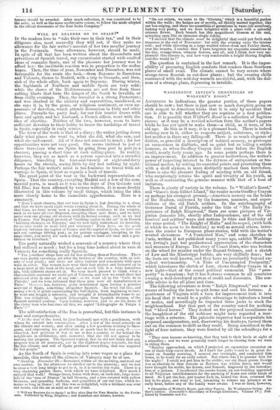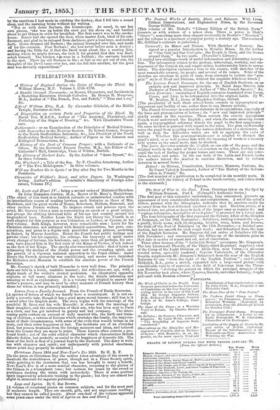WASHINGTON IRVING'S CHRONICLES OF WOLFERT'S ROOST.'
ACCOB.DING to indications the greater portion of these papers should be new ; but there is just now so much deception going on with respect to American books that it is only by accident that one is able to tell whether they are reprints or a first publica- tion. It is possible that Wolferes Roost is a collection of fugitive pieces; or it may be a revised selection from the author's papers while he has yet spirit to make them—a child, as it were, of his old age. Be this as it may, it is a pleasant book. There is indeed nothing new in it, either as respects subject, substance, or style ; but neither is there any falling-off. There is as much elegance of diction, as graceful a description of natural scenery, as grotesque an earnestness in diablerie' and as quiet but as telling a satirsatirichumour, as when Geoffrey Crayon first came before the English
world, nearly forty years ago. In some points perhaps there is an improvement. In addition to greater mellowness, the writer's power of imparting interest to the dryness of antiquarian or tra- ditional matter, by seizing its essential points and presetting them with a droll slyness, is more distinctly marked than heretofore. There is also the pleasant feeling of meeting with an old friend, who surprisingly retains the spirit and vivacity of his youth, as well as of contrasting the genuine manner with that of a host of imitators.
There is plenty of variety in the volume. In " Wolfert's Roost," and "Guests from Gibbet Island," the reader meets Geoffrey Crayon on perhaps his strongest ground,—American scenery on the banks of the Hudson, enlivened by the humours, manners, and super- stitions of the old Dutch settlers. In the autobiography of Governor Duval of Florida, under the title of "The Early Ex- periences of Ralph Ringwood," there are some pictures of Vir- ginian domestic life, shortly after Independence, and of the old hunters' and settlers' ways and notions in Ohio and Kentucky at the same period. "The Knight of Malta" and its sequel, (with both of which we seem to be familiar,) as well as several others, intro- duce the reader to European ghost-stories, told with the writer's wonted cleverness. "A Contented Man," and some sketches in. Paris written if not published many years ago, exhibit Washing- ton Irving's just but goodnatured appreciation of the characters and manners of Europe. The story of Count Horn, who was broken on the wheel for murder under the Regent Orleans, and a sketch of Law and the Mississippi bubble, are very skilfully done; but the facts are well known, and they have no peculiarity beyond ex- cellent workmanship. "A Time of Unexampled Prosperity," which introduces the sketch of Law, shows Geoffrey Crayon in a new light—that of the sound political economist. The "pros- perity" is American ; but it has features common to all countries owning a well-developed system of credit and discounts. The sen- sible advice is for all place and time.
The following adventure is from "Ralph Ringwood," and was a means of leading the hero to quit home and seek his fortune. A gentleman of Virginia with a turn for improvement took it into his head that it would be a public advantage to introduce a breed of mules, and accordingly he imported three jacks to stock the neighbourhood. But that part of the country cared for nothing but "blood horses." They looked on the proposed mesalliance as the haughtiest of the old noblesse might have regarded a mar- riage with a rotnrier. The patriotic improver had to repudiate his proposed amalgamation, and, disavowing his donkeys, turned them out on the common to shift as they could. Being considered in the light of ferm naturm, they were hunted by all the schoolboys for a ride.
"They soon became so knowing, that they took to their heels at sight of a schoolboy ; and we were generally much longer in chasing than we were in riding them.
"Sunday approached, on which I projected an equestrian excursion on one of these long-eared steeds. As I knew the jacks would be in great de- mand on Sunday morning, I secured one overnight, and conducted him home, to be ready for an early outset. But where was I to quarter him for the night ? I could not put him in the stable; our old Black groom George was as absolute in that domain as Barbara was within doors, and would have thought his stable, his horses, and himself, disgraced by the introduc- tion of a jackass. I recollected the smoke-house, an out-building appended to all Virginian establishments for the smoking of hams and other kinds of meat. So I got the key, put master Jack in, locked the door, returned the key to its place, and went to bed, intending to release my prisoner at an early hour, before any of the family were awake. I was so tired, however,
• Chronicles of Wolferes Roost, and other Papers. By Washington Irving. Au- thor's edition. (Constable's discellany of Foreign Literature. Volume 1V.) Pub lished by Constable and Co. by the exertions I had made in catching the donkey, that I fell into a sound sleep, and the morning broke without my waking. "Not so with dame Barbara, the housekeeper. As usual, to use her own phrase, 'she was up before the crow put his shoes on,' and bustled about to get things in order for breakfast. Her first resort was to the smoke- house. Scarce had she opened the door, when master Jack, tired of his con- finement, and glad to be released from darkness, gave a loud bray, and rushed forth. Down dropped old Barbara ; the animal trampled over her, and made off for the common. Poor Barbara! she had never before seen a donkey ; and having the Bible for it that the Devil went about like a roaring lion, seeking whom he might devour, she took it for granted that this was Beel- zebub himself. The kitchen a as soon in a hubbub ; the servants hurried to the spot. There lay old Barbara in fits ; as fast as she got out of one, the thoughts of the Devil came over her, and she fell into another, for the good soul was devoutly superstitious."



































 Previous page
Previous page